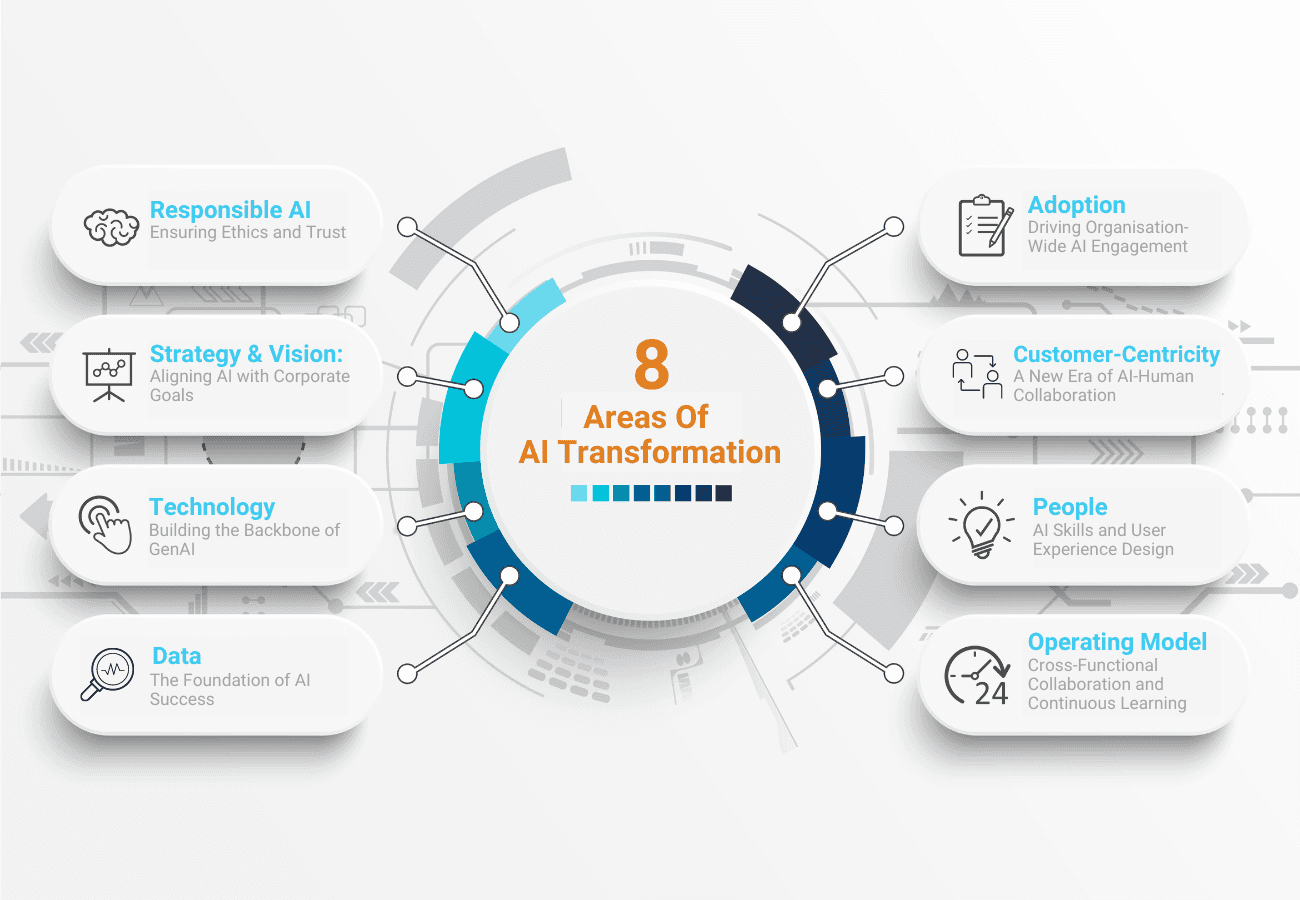AI Transformation
The 8 key areas for AI Transformation
So, what are the key areas that organisations need to address for effective AI transformation?
/ / / / / / / /
The 8 Key Areas Consultancy Firms must address for AI Transformation
As artificial intelligence (AI) continues to reshape industries every business is at a pivotal moment. In the next 1 to 2 years, the future of the most industries will be defined by how well they can adopt and integrate AI - not just as a tool for automation, but as a strategic driver of growth.
AI is projected to contribute up to $15.7 trillion to the global economy by 2030, presenting significant opportunities for businesses - if they act fast. However, those that fail to grasp AI’s potential risk being left behind.
To fully unlock AI's potential, organisations must align AI with business goals, develop strong data strategies, and foster collaboration between AI systems and human expertise. Here are the eight key areas that organisations need to address to achieve those goals and thrive in an AI-powered future.
1. Strategy & Vision: Aligning AI with Corporate Goals
AI cannot be an isolated initiative. To drive meaningful business transformation, AI strategies must be aligned with corporate goals. This requires collaboration between senior executives, AI suppliers, and teams delivering AI solutions.
According to a Deloitte study, 73% of executives believe AI will be critical to their business strategy. Yet many lack both the full awareness of the capabilities/opportunities of AI, and the AI the governance frameworks that will be needed to support this. Implementing a stage-gate process can help firms prioritise AI projects based on scalability and business value, ensuring they align with long-term growth objectives.
2. Data: The Foundation of AI Success
Data is the foundation of AI and the importance of a data strategy if an organisation is to fully benefit from AI cannot be stated strongly enough. The quality of the data directly impacts the effectiveness of AI systems. The simple adage of garbage-in-garbage-out applies to AI!
Simply throwing data at AI won't deliver results - structured and organised data is key. For consultancies, the ability to manage both structured and unstructured data is critical. For consultancies this is where Ontologies and Generative AI-Ready Datasets (GRDs) come into play.
A Generative AI-Ready Dataset (GRD) is a collection of data that’s organised and cleaned to help AI work effectively, like giving a car high-quality fuel so it runs smoothly.
An ontology adds a map to this process, showing the AI how different pieces of information in the data are connected – this is especially important for consultancy domain knowledge management to work effectively. It’s like giving the car a GPS system that tells it where to go so it can navigate through the data accurately and generate useful results.
In simple terms, GRDs provide the fuel (clean, structured data), and ontologies provide the map (helping the AI understand how everything is connected). Together, they ensure AI can deliver accurate and meaningful outcomes.
Organisations that master their data strategies will gain a competitive edge. By creating AI-ready data structures, organisations can offer richer insights and more powerful AI-driven solutions.
3. Customer-Centricity: A New Era of AI-Human Collaboration
AI will commoditise much of the grunt work - such as data collection and analysis - that organisations handle today. This means they have more time free to focus on enhancing customer-centricity by leveraging the value of human interaction and engagement.
While AI can automate repetitive tasks, human expertise will remain vital for delivering complex, value-driven services. Currently, 80% of companies use AI for customer service, but the potential goes even further. AI will enable organisations to serve more clients, more efficiently, while maintaining strong profit margins.
For example, AI can handle initial customer queries, data analysis, and project management tasks, allowing consultancy firms to focus on high-value problem-solving and client engagement. Firms that excel in AI-human collaboration will lead the way in revolutionising consultancy from the client’s perspective.
4. Operating Model: Cross-Functional Collaboration and Continuous Learning
AI frees human time for creative and strategic work, but organisations must adopt an operating model that encourages cross-functional collaboration and continuous learning. This means bringing together AI experts, employees, and industry specialists to develop comprehensive AI solutions.
According to McKinsey, AI has the potential to increase productivity by 40%, but only if organisations promote collaboration between business, technical teams, and their suppliers
5. People: AI Skills and User Experience Design
As AI becomes embedded in business processes, AI literacy across all levels will become essential. 85 million jobs could be displaced by automation by 2025, but 97 million new roles could be created, emphasising the need for reskilling (PwC).
Training programmes should not only cover technical skills but also focus on designing user experiences (UX) that leverage AI to enhance client engagement. AI will accelerate the pace of operations, and firms must be prepared to deliver Accelerated Experiences (AX) across every touchpoint in their business.
Organisations that prioritise AI skills development will not only position themselves as industry leaders, but also equip their teams to fully exploit AI opportunities.
6. Adoption: Driving Organisation-Wide AI Engagement
To fully unlock AI’s potential, consultancies must embrace organisation-wide AI adoption. AI cannot remain siloed in technical teams - it must be integrated across the business. A robust change management strategy will help AI be seen as an empowerment tool, not a threat.
Early adopters of AI are three times more likely to achieve business goals than those who lag behind.
To ensure broad adoption, businesses should designate AI champions, highlight early success stories, and invest in training to reduce resistance to AI-driven changes.
7. Responsible AI: Ensuring Ethics and Trust
As AI becomes ubiquitous, ethical AI practices are crucial for ensuring trust, compliance, and privacy. Organisations must implement governance frameworks to address transparency, explainability, and bias mitigation.
There are already wide-spread issues with businesses walking into issues (even with relative low-level A use) with privacy and GDPR compliance without realising the consequences. These issues will only increase and require urgent attention by all businesses.
According to Gartner, 85% of AI projects will deliver erroneous outcomes due to bias if ethical frameworks are not implemented. With GDPR and privacy concerns being immediate issues, consultancies must address these proactively to maintain client trust and differentiate themselves in the marketplace.
8. Technology: Building the Backbone of GenAI
A robust technological infrastructure is crucial to support Generative AI (GenAI). While AI tools like ChatGPT have made AI more accessible, consultancies must invest in the infrastructure needed to support the new needs that come with AI, areas such as LLMOps, CI/CD pipelines, and cloud platforms for scalability.
In simple terms, LLMOps provides the necessary infrastructure to keep AI models running efficiently and securely, making it a key operational component for consultancies. CI/CD pipelines allow consultancies to be more agile, deliver AI solutions quickly, maintain high-quality standards, and scale their services efficiently.
It’s estimated that AI could add 1.2% to annual GDP growth in countries that fully embrace it, highlighting the need to build the right technological backbone. Most SME consultancies may lack the capacity to manage these complex systems internally, but partnering with a trusted supplier like Axcelium can help ensure long-term scalability and sustainability.
The Path Forward for Consultancies
The future of AI for consultancies will be shaped by firms that integrate AI into every facet of their business. From strategy and governance to data management and customer engagement, consultancies that prioritise these key areas will be well-positioned to lead the next wave of AI transformation.
At Axcelium, we are committed to helping businesses achieve AI-driven growth by providing the tools and expertise needed to seamlessly integrate AI into their operations. As businesses move from AI experimentation to full-scale transformation, the opportunities for growth, innovation, and value creation are boundless.
The question isn’t “if” AI will transform your business, but “how fast” you can adopt AI to gain a competitive edge. The future of AI in any business isn’t just about technology - it’s about people, vision, and creating a sustainable, collaborative future.
Latest
From the Blog
Discover fresh insights, practical tips, and empowering stories to help you on your journey towards a happier, healthier, and more fulfilling life. Dive into our most recent posts below and embark on a path of continuous growth and self-discovery.
Download Nika Template

